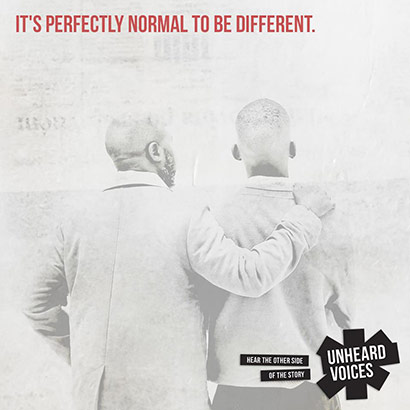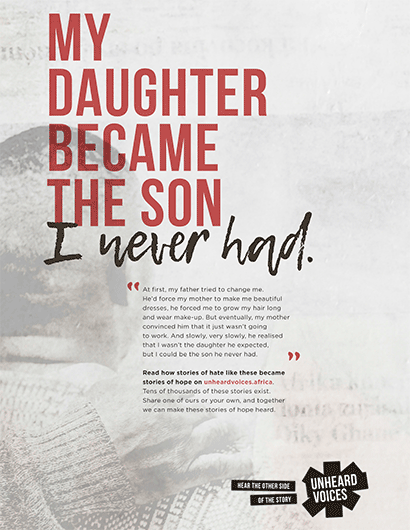LGBT awareness campaign launched in Southern Africa
 A radio and digital campaign called Unheard Voices launched on 8 June, sharing real-life stories of people across Southern Africa who are LGBT or sex workers and how they were accepted.
A radio and digital campaign called Unheard Voices launched on 8 June, sharing real-life stories of people across Southern Africa who are LGBT or sex workers and how they were accepted.
These never-heard-before human stories show us how for every act of intolerance, there is an act of compassion. These are the stories of mothers, fathers, grandfathers, grandmothers, aunts, uncles, brothers, sisters, friends, co-workers, healthcare workers, religious and traditional leaders.
One of the many stories from South Africa demonstrates the enormous emotional impact that can be felt from just small gestures of support:
“Many years ago, my parents celebrated my birth, a healthy baby girl, but I always knew I was a boy. I am now living as a trans man. One day, I went to help a neighbour with her garden. I helped her most of the day and at one point, she turned to me and said: ‘You be exactly who you are. God loves you just as you are.’ She didn’t need to say anything more. From that day on, I knew she was on my side,” recounted a transgender man.
“The positive stories shared show that many people are choosing to open their minds and hearts to live in harmony with people who may be different to them,” said Juliet Mphande, the Communications & Media Advocacy Manager from AMSHeR in South Africa. “We hope it will inspire others to do the same.”
You can read more moving real-life stories on the website.
The campaign has worked with four regional networks that represent people of different sexual orientations, gender identities and expression as well as sex workers to unearth these stories. This includes African Men for Sexual Health & Rights (AMSHeR), the Coalition of African Lesbians, the Southern African Trans Forum and the African Sex Workers Alliance.
The campaign is meant to encompass countries such as South Africa, Lesotho, Swaziland, Namibia, Botswana, Zimbabwe, Zambia and Malawi. Mambaonline understands, however, that radio stations in some of the countries have refused to broadcast the project’s ads.
A recent study in South Africa, called Progressive Prudes: A survey of South Africa Attitudes to Homosexuality and Gender Non-Conformity confirms that more people are open-minded about different sexual orientations and gender identities or expressions than not.
More than half the population say that they would “accept” a gay family member, that gay and lesbian people should be included “in my culture and tradition” and that they should be given the same human rights as all other South Africans. A huge majority (8 out of every 10 people) also said that they have not, nor would they ever consider, verbally or physically abusing someone who was gender non-conforming.”
The project is attracting champions across different spheres. Futhi Luthuli, a South African clinician commented: “The stories published by the Unheard Voices project reminds us that there is more that unites us than divides us. It is encouraging to see people choosing love, friendship and respect rather than violence and hate.”
 Risimati Samuel Khandlhela, and Official from the Department of Traditional Affairs said: “Over many decades, South Africa and the world have fought against the demon of discrimination based on one’s colour. Today, we are facing other demons in our region and continent, those of discrimination, prejudice, stigma and violence against people living with HIV and AIDS, and members of the LGBTI community.
Risimati Samuel Khandlhela, and Official from the Department of Traditional Affairs said: “Over many decades, South Africa and the world have fought against the demon of discrimination based on one’s colour. Today, we are facing other demons in our region and continent, those of discrimination, prejudice, stigma and violence against people living with HIV and AIDS, and members of the LGBTI community.
“In the same way as we fought against apartheid, leaders in the political, religious and traditional leadership spheres, as well as activists, champions and members of communities from all walks of life, must join hands and fight against these demons, that are still rearing their ugly heads. We dare not fail, victory is certain.”
The project is part of the KP REACH programme funded by The Global Fund, managed by the non-profit organisation Hivos, which seeks to reduce stigma and discrimination against people who are gay, bi-sexual, lesbian, transgender or engage in sex work as it is a key barrier to people feeling safe accessing vital health services.
“Unheard Voices is important because we know that fear of being stigmatised and discriminated against is a key barrier to accessing vital health services, including HIV prevention and treatment services, for people who are gay, lesbian, bi-sexual, transgender or engage in sex work,” said Kate Thomson, Head, Community Rights & Gender at the Global Fund. “We cannot end HIV as an epidemic unless we address stigma and discrimination.”
Leave a Reply